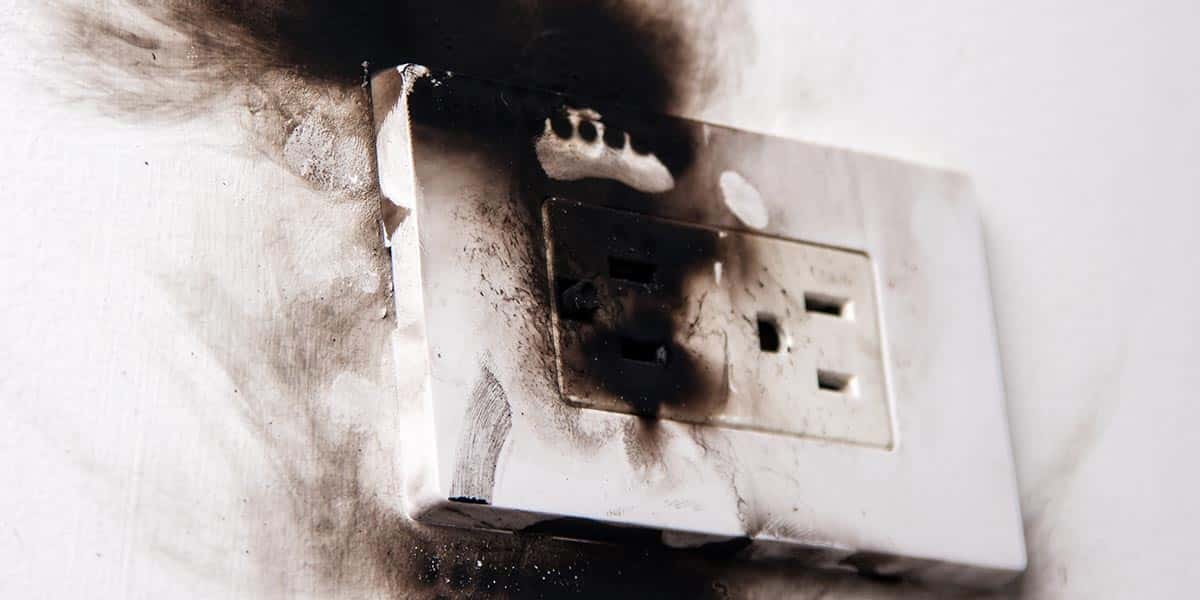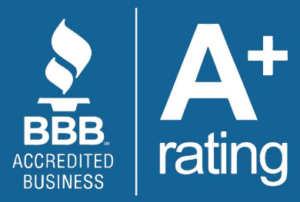Last updated on June 23rd, 2023 at 02:19 am
Power surges can damage your appliances and devices, and that’s just the start.
What would you do without electricity? You rely so much on this modern invention that it may be difficult to imagine life without it. And the dependence on electricity appears to be growing even more with increasing sales of electric vehicles and smart devices.
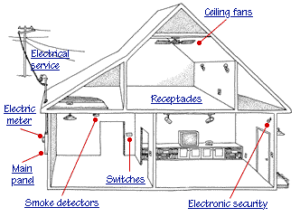
Since electricity plays a major role in your everyday life, especially at home, your energy supply must be dependable and consistent. However, every so often, you may experience a power surge that interrupts your daily routine or, even worse, damages your property.
Investing in whole-house surge protection is one way to prevent significant damage to your electrical appliances and devices when voltage spikes occur. Keep reading to learn additional ways you can protect your home. You’ll also find out everything you need to know about power surges — causes, effects, and preventative and safety measures — so you can better equip yourself in the event they happen.
What Is a Power Surge?
Typically, you receive 120 volts of power flowing through a standard wall outlet. At times, that voltage can shift between 0 and 169 volts. But when it suddenly surpasses 169 volts, that’s a power surge, also known as transient voltage.
A power surge can originate inside your home when a current of electricity passes through an electrical device and exceeds the normal operating range. This higher-than-normal surge of power can result in an electrical arc and heat damaging or possibly destroying your electrical wiring and other components. In some cases, small power surges can occur without you knowing and gradually reduce the performance of or ruin your electronic equipment.
What Causes a Power Surge?
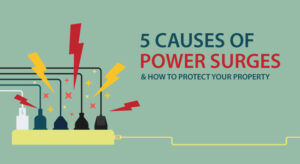
There are three leading causes of a power surge. For one, there can be an interruption in the energy flow, like a power outage or blackout, followed by a short. The other causes can be an overload of power through a system or faulty wiring.
So if you experience a surge inside your home, that indicates increased power fluctuations from large appliances, such as air conditioners, washers, dryers, furnaces, and power tools. Power surges outside your home usually occur because of a change in the power grid or when lightning takes out power lines or a transformer. Let’s examine each of these causalities in more detail.
Electrical Overload
An increase in power drawn from a single circuit can result in an electrical overload, which happens to be a common cause of internal power surges. This excess power, followed by a voltage spike, mainly occurs when you overuse extension cords or have too many appliances or electronic devices plugged into the same circuit. You will mostly see electrical overloads with space heaters, hair dryers, power tools, HVAC units, and large appliances.
Bad Wiring
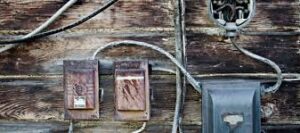
Outdated electrical systems or damaged, exposed electrical wires can also cause power surges. The tricky thing is you may not always be able to spot when your wiring is faulty. In some cases, the bad wiring could be located behind the walls of your home.
Fortunately, there are signs faulty wiring is present, including:
- Scorched marks on outlets
- A burnt smell or buzzing sound coming from outlets
- Frequently tripped circuit breakers
If you notice these signs, you should immediately disconnect any electrical devices and switch off the power to the area where you suspect faulty wiring. Then, it’s best to reach out to a certified electrician to identify the issue and get the electrical wiring repaired or new wiring installed.
Lightning Strike
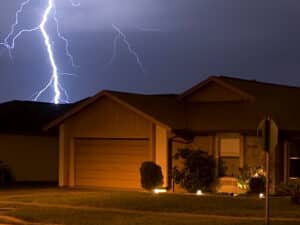
A lightning strike is another cause of voltage spikes, but its damage affects your appliances indirectly. Lightning can wreak havoc by directly hitting power lines, which delivers large amounts of voltage.
When a lightning strike occurs, the system is forced to bear this overwhelming electrical current, triggering a tremendous power surge. In this situation, all devices without surge protection should be unplugged during severe thunderstorms.
Power Outage (Blackouts)
Large-scale power grid failures can lead to power outages or blackouts. Since there’s a lack of electricity, there’s no reason for any spikes in voltage.
The problem usually occurs when the power is restored. After the electricity returns, a sudden jump in current can take place, resulting in a power surge. Similar to a lightning strike, power outages can potentially damage any plugged-in electrical device that doesn’t have surge protectors.
Signs of an Impending Power Surge
As mentioned earlier, you may be able to tell if a power surge will happen by specific warning signs. To protect yourself and your home, you should look out for the following indications of an impending voltage spike:
- Buzzing noises coming from outlets or lights
- Flickering or dimming lights
- Busted wires
- Discoloration or burnt areas surrounding outlets or wires
- Warm, vibrating, or smoky outlets
- A burning smell or an unusual, sharp odor near outlets
Signs of a power surge that has already happened include devices unexpectedly shutting off or not functioning, pungent smells surrounding an appliance or device, or lights flashing on digital clocks.
How to Prevent a Power Surge
Preventing a power surge from destroying your property can be pretty straightforward. There are several actions you can take to safeguard against electrical surges.
Inside your home, you can ensure your devices and appliances are not overcrowding one circuit. Air conditioners, heaters, and large appliances should not be plugged into the same socket as smaller appliances. It’s also best to unplug electronics that are not in use. And you should update any old wiring and your electrical panel to ensure it’s up to code.
External power surges may be out of your control, but you can still prevent the indirect damage they can cause. Unplugging all electrical devices and appliances during a severe storm is one preventative measure you can take.
You also want to trim your trees, and the areas around your electricity service should be debris-free. If your electrical service entrance lines are underground, make sure that area is clear and adequately protected.
Another safety precaution is using surge protectors for all your appliances and electrical gadgets. These may include special wall outlets that can be found at most local hardware or home improvement stores.
How Does Surge Protection Work?
With surge protection, also known as spike suppressors, surge suppressors, and surge diverters, you’re basically blocking the excess voltage from getting to your electronics if a power surge were to occur. Surge protectors are helpful devices, but they aren’t necessary for your electronics and appliances to function under normal circumstances.
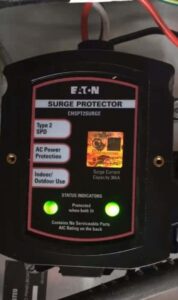
However, if you choose not to use them and there’s a power fluctuation accompanied by a surge, you may risk severe damage to your plugged-in devices. Instead of purchasing individual surge protectors that cover a few devices at a time, we recommend installing a whole-home surge protection device to shield all of your electronics from unavoidable external events. You would need to attach the protector to your main electrical bus bar and then connect it to your neutral bus bar.
Installation is pretty straightforward, but you can always hire an expert for help setting up your whole-home surge protector.
More Safety Tips
Now that you’re aware of what a power surge is and what causes it, keeping your home safe from the effects of a power surge should be a top priority. As you can see from this guide, power surges can be preventable.
By following the safety tips provided, including the use of surge protectors, you will be maintaining the life of your devices, so you don’t have to waste money purchasing new ones.
